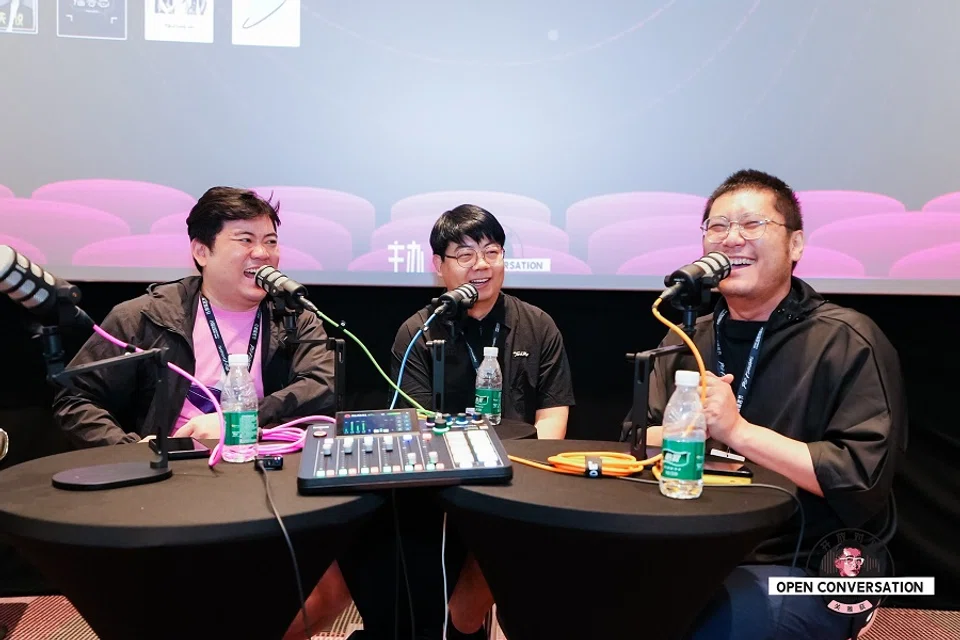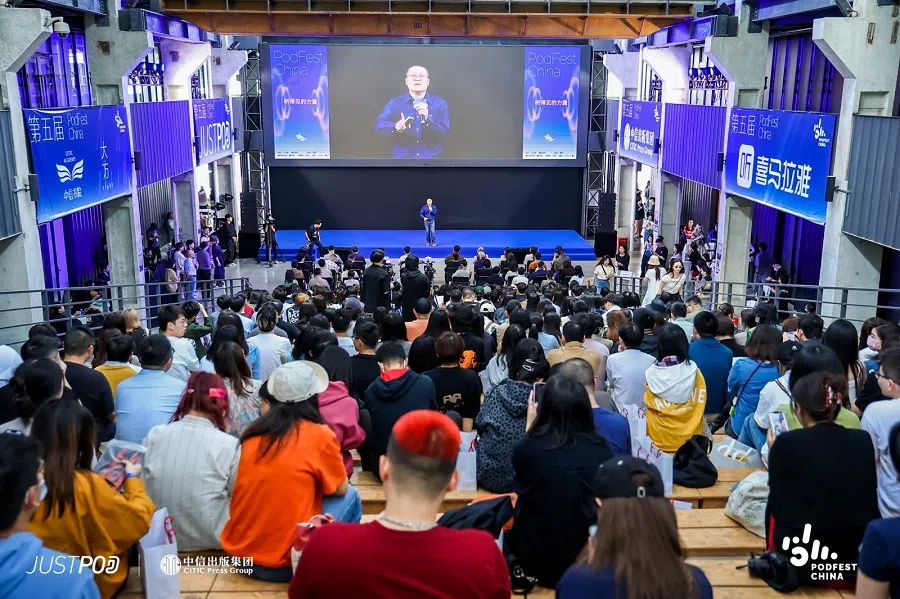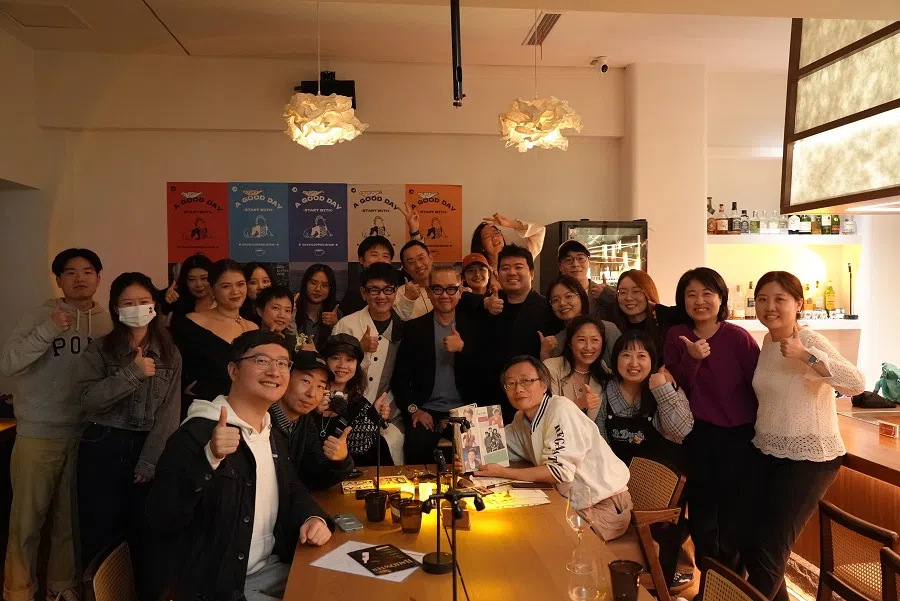The paradox of China’s podcast boom: High minds, low pay
Chinese youths are increasingly turning away from mainstream media towards podcasts as they provide more engaging in-depth coverage of current affairs and issues. Lianhe Zaobao senior correspondent Chen Jing finds out more from podcast creators and listeners about the industry and its appeal.

Fed up with constant push notifications about the US-China tariff war, 29-year-old Shanghai white-collar worker Cheng Yutong has switched to following podcast episodes on the topic through hosts she follows on the Xiaoyuzhou app.
Podcasts have become Cheng’s primary source of in-depth information. She told Lianhe Zaobao, “News websites are too serious, and the content on short video platforms is often hard to verify. But podcasts can explain the full context of events more thoroughly in a relaxed and engaging way. It’s like chatting with friends — before you know it, you’ve learnt some new information.”
The typical profile of a Chinese podcast listener is a well-educated young woman with a respectable job in a major city.
Surge since the pandemic
As traditional media in China face tighter controls and social media consumption grows increasingly fragmented, more audiences like Cheng are turning to podcasts, fuelling the rapid growth of this emerging media platform.
According to data from business analytics platform Statista, China’s podcast audience last year was estimated at 134 million — about 12 out of every 100 internet users listens to podcasts. Market research firm eMarketer predicts this number could grow to 179 million by 2027.
The typical profile of a Chinese podcast listener is a well-educated young woman with a respectable job in a major city.
According to the 2024 Podcast Industry Report jointly released by podcast Ritanbbpark (《日谈公园》), podcast platform Ximalaya and market research firm Ipsos China, nearly 80% of the 2,064 respondents were aged between 18 and 40, and two-thirds were women. By contrast, a survey by Edison Research during the same period found that nearly 60% of podcast listeners in the US are male.
Yang Yi, co-founder of the podcast production company JustPod, said when interviewed that in the early days, the technical barriers to producing, publishing and listening to podcasts were relatively high, and most users on podcast platforms were male. In early 2020, the launch of Xiaoyuzhou — a mobile app dedicated to podcasts — made podcast creation and listening more accessible, leading to a surge of female creators and listeners.

Five years on since 2020 — or “Year One” of podcasts in China — Xiaoyuzhou, now one of the country’s leading podcast platforms, has a user base that is 70% female.
According to the 2024 Chinese Podcast Outlook (《2024中文播客新观察》) by JustPod, over 84% of surveyed listeners are from first- and second-tier cities in China, and more than 90% hold at least a bachelor’s degree. Over half are white-collar workers or professionals such as doctors, lawyers and teachers, with an average monthly income of 16,361 RMB (US$2,270).
“Podcast discussions tend to be more measured and rational. Many hosts are journalists or experts who offer higher quality, more in-depth content.” — Xu Bingrong, 38, a podcast listener
Xu Bingrong, 38, is a typical listener. She had previously worked in Beijing and the Netherlands, and is currently pursuing a master’s degree in Japan. Two of her regular listens are The Weirdo (《不合时宜》), which focuses on European issues, and Asian Talk (《东亚观察局》), which discusses East Asian affairs.
When interviewed, Xu said that she has long followed current affairs, but found that platforms like Weibo and WeChat public accounts often contain extreme or polarised opinions. She shared, “Podcast discussions tend to be more measured and rational. Many hosts are journalists or experts who offer higher quality, more in-depth content.”
Society and humanities content most popular
As demand for quality content grows, the number of podcast creators is also growing rapidly. Last year alone, over 46,000 new shows were launched on Xiaoyuzhou.
Topics on society and humanities — including politics, culture and history — remain the most popular. According to the 2024 Chinese Podcast Outlook, 84.3% of listeners prefer this type of content.
Liu Fang (pseudonym), a civil servant in Xiamen who regularly listens to current affairs podcasts, has noticed that podcasts offer a broader range of topics compared with traditional media. Liu shared, “Even when covering the same issue, podcast discussions tend to be more open — some content simply can’t be heard on mainstream media.”
Many of their listeners are “global citizens” living in different countries, “people with a more open mindset towards world events. That gives us more motivation to speak out.”
Podcast creators share this sentiment. Xie Ruohan, co-host of The Weirdo, gave an example from early 2022: at the start of the Russia-Ukraine war, she and her co-host Wang Qing, both media professionals based in Europe, travelled to the border between Poland and Ukraine. They used their podcast to share content that could not be published in domestic media, “to provide a more comprehensive account of what we saw and felt on the ground”.
Wang explained that many of their listeners are “global citizens” living in different countries, “people with a more open mindset towards world events. That gives us more motivation to speak out.”

Xie added that their show’s topics are mostly focused on international events, not only because both hosts live abroad long term, but also because discussing domestic public issues comes with higher censorship risks. For example, during the pandemic, an episode comparing pandemic policies in different countries was taken down by the platform.
She explained that podcast censorship differs from that of institutional media in that it generally follows a “publish first, review later” model, which leads many creators to somewhat censor themselves. Xie said, “There’s more leeway when it comes to international news. But if you comment on domestic policy, you’re taking a risk. Hosts are never told exactly what the review standards are; most of the time, it’s left to personal discretion.”
The seemingly looser regulation of podcasts compared with other platforms is not due to higher technical barriers in audio censorship, but rather because podcasts are less likely to trigger waves of public opinion that attract regulatory attention. — Yang Yi, a Chinese commentator
Yang Yi, a long-time observer of the Chinese podcast ecosystem, believes that the seemingly looser regulation of podcasts compared with other platforms is not due to higher technical barriers in audio censorship, but rather because podcasts are less likely to trigger waves of public opinion that attract regulatory attention.
He explained that with short videos or WeChat articles, audiences can grasp the gist within seconds and decide whether to share them. “But with a podcast, you often need to listen for at least ten to fifteen minutes to really understand what it’s about, which makes rapid, viral-style dissemination unlikely,” he said.
Despite the seemingly diverse and flourishing landscape of China’s podcast platforms, media censorship is still unavoidable, and the internet firewall remains firmly in place.
Although Xiaoyuzhou does not explicitly ban foreign podcasts, the proportion of overseas or foreign-language content on the platform is extremely low. Similarly, the Apple Podcasts platform operates with regional restrictions like the App Store, and most overseas shows are inaccessible from mainland China.
Personality-driven shows
As the podcast listener base expands, the range of content is also becoming more diverse. Last year, both finance-related and entertainment-focused shows saw significant increases in audience numbers.
Fan Yiru, who has been podcasting for 12 years, currently hosts as many as 11 shows simultaneously. From Asian Talk, which focuses on political affairs; to Shanghai Talk (《上海闲话》), which highlights Shanghainese culture; and finance-focused Fan Gogh MoneyTalk (《梵高MoneyTalk》), all programme ideas and themes are decided by Fan.

When interviewed, Fan said that compared with his previous work in traditional media, podcasting offers far greater freedom in what is discussed and how. Last year, he even recorded an episode titled “A Man at Forty” (男人四十) to mark his 40th birthday, sharing his reflections on reaching middle age.
“Many people ask, ‘Why would you choose to talk about that?’ As my shows are more personality-driven, long-time listeners tune in for me; they’re usually interested in whatever I have to say.”
Loyal listener Liu Fang said that he has learned a lot about Fan through his podcasts, adding, “Listening to podcasts deepens your understanding of the host over time. Compared with reading newspapers or watching television, there’s a closer sense of companionship.”
Commercialisation does not mean profitability
The close connection between podcast hosts and their listeners has also made audiences more accepting of hosts taking sponsorships. According to the 2024 Podcast Industry Report, 45.9% of respondents had purchased paid content in the past year, and 63.6% expressed acceptance of advertisements.
In April last year, media personality Leung Man-tao launched a paid podcast titled Eight and a Half Minutes (《八分半》), priced at 299 RMB. A year later, the show has gained over 32,700 paying listeners on Xiaoyuzhou and 51,000 subscribers on Ximalaya.
The two hosts revealed that their own average monthly income from podcasting last year was just 5,416 RMB each, hardly enough to support themselves.

Fan also runs four paid podcast series and helps organise ticketed live podcast festivals. He has been financially self-sufficient through podcasting for the past two years but is quick to emphasise that this is far from the norm in the industry.
He shared, “I’m especially wary of giving the impression that making money from podcasting is easy. Compared with short videos, the commercial value of podcasts is still not widely recognised by the market. Only a very small number of top-tier hosts make a profit.”
With over half a million subscribers, The Weirdo is considered a top-tier podcast in China. Yet in early April, it found itself embroiled in a pay dispute with a former intern. In a written response to the intern’s criticism that the monthly salary of 3,500 RMB was too low, the two hosts revealed that their own average monthly income from podcasting last year was just 5,416 RMB each, hardly enough to support themselves.
Xu Bingrong, a listener who has purchased paid content, hopes to see Chinese podcasting thrive and evolve into a mature market like that in the US. But she also worries that rapid growth in influence could trigger tighter government controls, adding, “While it might be selfish to think this, but it may not be so bad if things stay as they are.”
However, Yang Yi believes that maintaining the status quo is unrealistic for Chinese podcasts. He said, “Growth is inevitable. As the industry develops and creators begin to benefit, they’ll also need to learn how to engage with mainstream audiences and navigate regulation. In China, it’s unlikely that anything will remain entirely unregulated.”
This article was first published in Lianhe Zaobao as “受年轻精英听众追捧 中国播客从小众走向主流”.



![[Big read] When the Arctic opens, what happens to Singapore?](https://cassette.sphdigital.com.sg/image/thinkchina/da65edebca34645c711c55e83e9877109b3c53847ebb1305573974651df1d13a)
![[Video] George Yeo: America’s deep pain — and why China won’t colonise](https://cassette.sphdigital.com.sg/image/thinkchina/15083e45d96c12390bdea6af2daf19fd9fcd875aa44a0f92796f34e3dad561cc)
